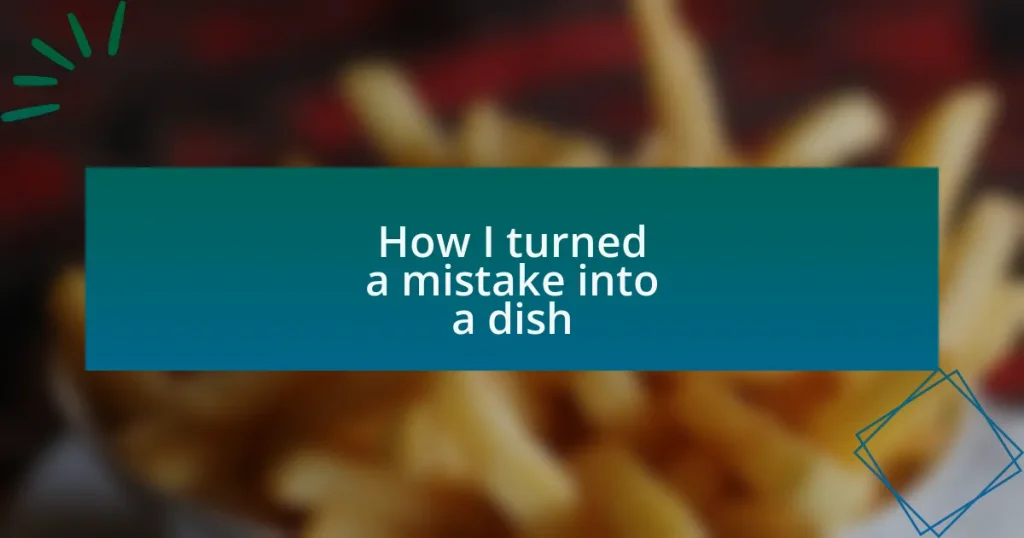Key takeaways:
- Evelyn Harrington emphasizes the importance of embracing culinary mistakes, seeing them as opportunities for creativity and innovation.
- Common cooking errors include overlooking seasoning, miscalculating timing, and not thoroughly reading recipes, which can lead to unexpected outcomes.
- Sharing mistakes fosters community and encourages a culture of learning in the kitchen, turning blunders into bonding experiences.
- Documenting errors can inspire new culinary creations and help avoid repeating the same mistakes in the future.
Author: Evelyn Harrington
Bio: Evelyn Harrington is an acclaimed author known for her evocative storytelling and intricate character development. With a background in literature and creative writing, she has published several best-selling novels that explore themes of resilience and identity. Her work has garnered numerous awards, including the prestigious Waverly Prize for Fiction. When she’s not writing, Evelyn enjoys hiking the scenic trails of her hometown and engaging with her readers through her popular blog. She currently resides in Portland, Oregon, where she continues to craft compelling narratives that resonate with audiences worldwide.
Introduction to British Bistro Cuisine
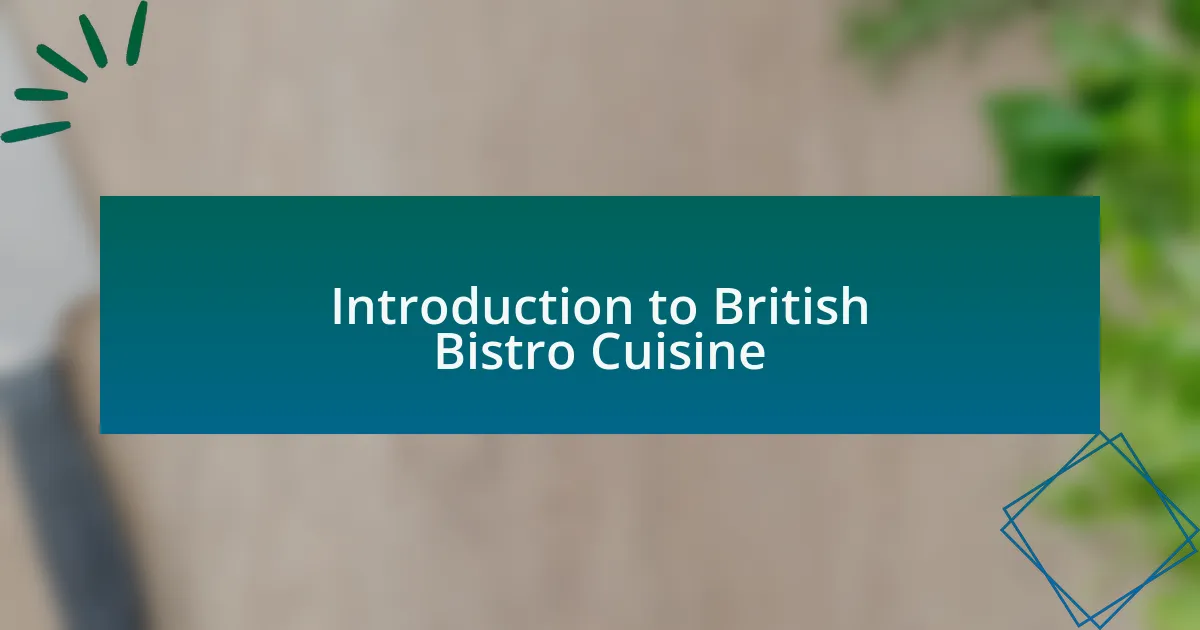
British bistro cuisine is a delightful blend of tradition and innovation, showcasing the best of local ingredients while embracing modern culinary techniques. I’ve often found myself captivated by the simple yet profound flavors that characterize these dishes. Have you ever tasted a perfectly cooked shepherd’s pie, its rich filling wrapped in a golden crust? It’s a reminder of the warmth and comfort that British cuisine can provide.
I recall the first time I stepped into a quaint bistro in a cozy neighborhood, drawn in by the aroma of freshly baked bread. The charm of British bistro cuisine lies not just in its hearty dishes but also in the sense of community it fosters. Each meal is like a story, inviting you to savor every bite and moment spent with loved ones over a shared table.
As I explored more bistros, I couldn’t help but notice a growing trend to infuse classic recipes with contemporary twists. It brings to mind the question: how do we honor our culinary heritage while embracing the evolution of taste? This dynamic approach adds excitement to the dining experience, encouraging chefs to reimagine beloved favorites and invite diners on a flavorful journey that reflects both the heart of Britain and the influence of global gastronomy.
Common Mistakes in Cooking
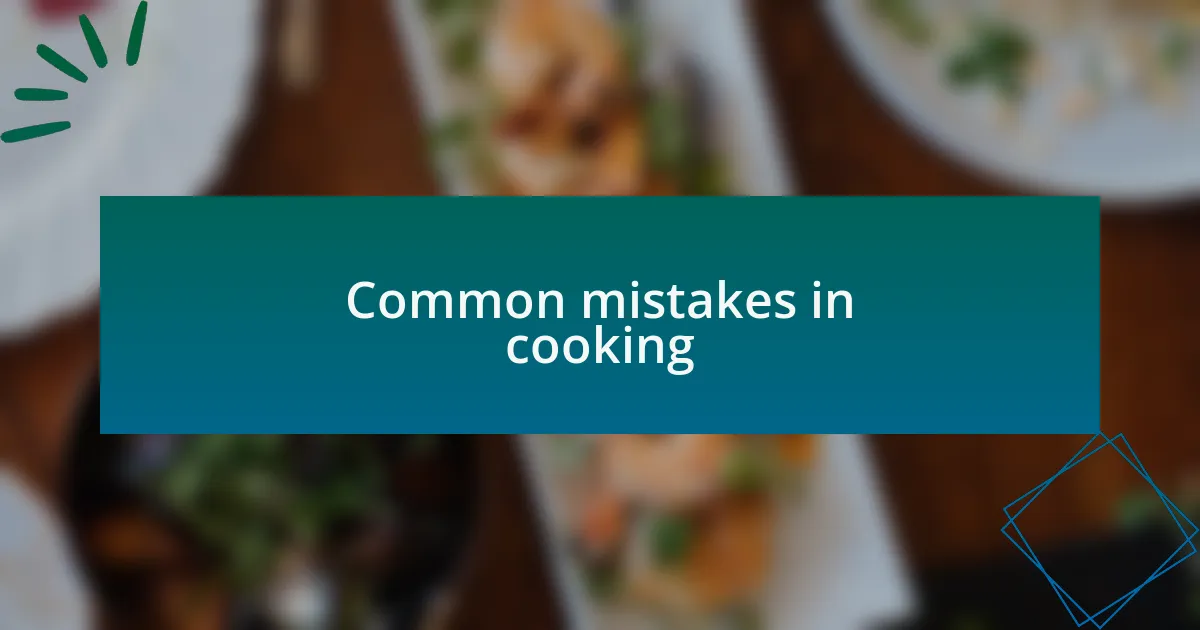
When it comes to cooking, one of the most common mistakes I’ve encountered is overlooking the importance of seasoning. I remember once preparing a chicken dish, so focused on the technique that I forgot to salt it sufficiently. When I finally tasted it, I was met with disappointment. That experience taught me just how crucial it is to enhance flavors right from the start. Have you ever made a similar oversight? It’s a simple step that can elevate a dish from bland to extraordinary.
Another frequent mishap happens with timing—especially when multitasking. I can vividly recall a dinner party where I miscalculated the cooking time for my roast veggies. The outcome was a charred mess rather than the caramelized perfection I envisioned. This taught me the value of managing my kitchen timeline and, more importantly, the art of patience. How often do we rush in the kitchen, only to end up with subpar results?
Lastly, not reading the recipe thoroughly can lead to unexpected consequences. I’ve rushed through a recipe only to realize halfway that I’d missed a crucial step or ingredient. On one occasion, I neglected to let my dough rest, resulting in tough bread instead of the light, airy loaf I’d hoped for. It made me realize that taking a moment to carefully read through a recipe can save time and ingredients in the long run. Isn’t it fascinating how a little attention can turn a potential disaster into a culinary triumph?
Turning Mistakes into Opportunities
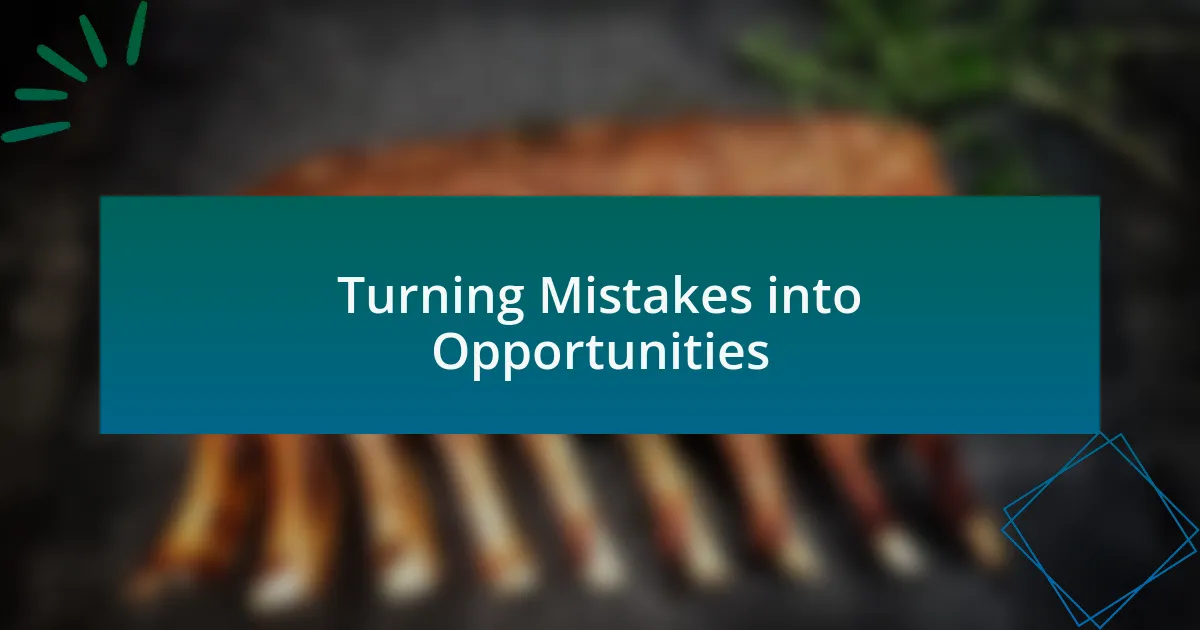
When mistakes happen in the kitchen, I often find they lead to unexpected discoveries. One time, while preparing a seafood pasta, I accidentally dropped half a jar of crushed red pepper into the pot. Rather than panicking, I decided to embrace the heat, adding cream to balance it out. The result was a spicy yet creamy dish that my guests raved about. It made me realize that a cooking blunder could turn into a signature flavor—how often do we miss out on potential culinary creations simply by not allowing ourselves to explore?
Sometimes, mistakes teach us lessons we didn’t know we needed. I remember a time when my desire to innovate led me to try a new herb blend on a traditional classic. Instead of the expected flavor profile, I ended up with an overwhelming taste that left the dish unrecognizable. Initially, I felt disheartened, but I used that experience to fuel my creativity. Now, I experiment with new ingredients boldly, knowing that even failure can guide my palate toward something extraordinary. Isn’t it exciting to think about how our missteps can mold our culinary identity?
Additionally, I’ve learned that sharing mistakes openly can foster a sense of community in the kitchen. In one instance, I accidentally undercooked chicken during a weekend gathering, and instead of trying to cover it up, I laughed it off with my friends. This candidness led to a lighthearted conversation about everyone’s kitchen flops, and we ended up bonding over our shared experiences. Isn’t it refreshing to teach and learn from each other’s blunders rather than hide them? This approach not only normalizes mistakes but also encourages a culture of growth and learning in our culinary adventures.
The Dish That Changed Everything
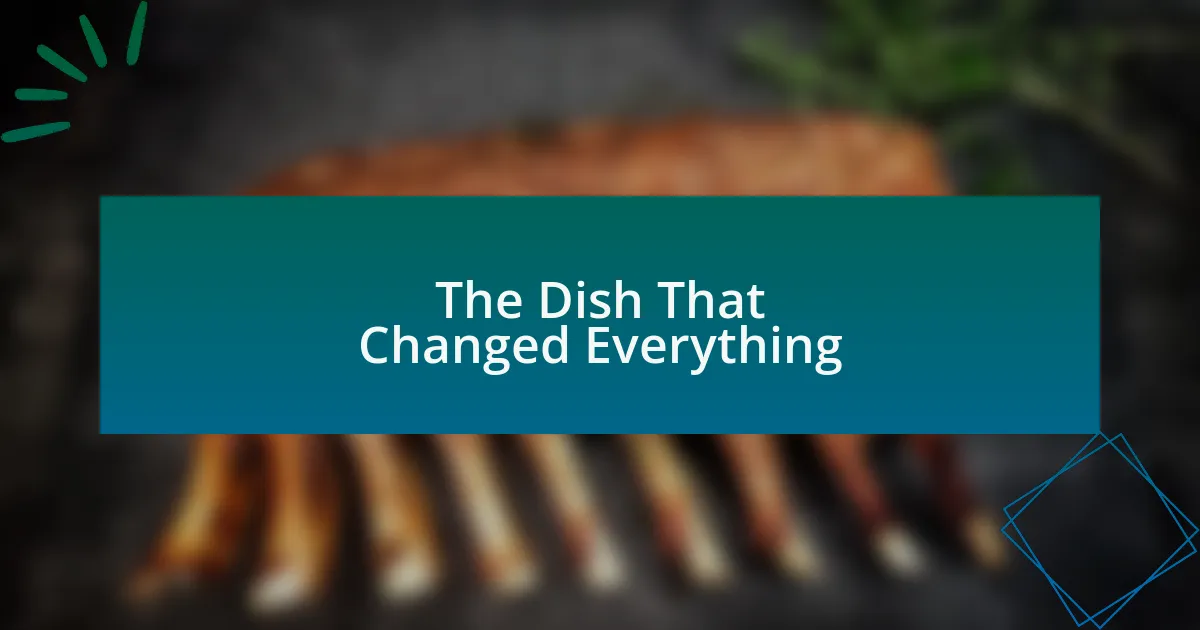
The dish that changed everything for me was a simple risotto. One night, while preparing for an important dinner service, I miscalculated the broth-to-rice ratio. Instead of yielding a creamy delight, I ended up with a clumpy, sticky mass. At first, panic set in, but then I remembered my grandmother’s wise words: “Nothing is truly lost if you’re willing to adapt.” So, I tossed in some vibrant sautéed vegetables and a sprinkle of fresh herbs, transforming it into a delightful and unexpected creation that brightened the whole plate. Have you ever had a moment like that where a mistake led to something wonderful?
Looking back, this dish became a cornerstone on my menu. It wasn’t just about the flavors that emerged; it represented a mindset shift. I realized that allowing imperfections to inform my cooking process could lead to innovation. Each spoonful of that risotto echoed the spirit of experimentation. Isn’t it fascinating to think how a single mistake can pave the way for new culinary traditions?
Even now, I sometimes catch myself reminiscing about that night. It serves as a reminder that in the heat of the kitchen, embracing uncertainty can lead to joy. Whenever chefs ask me for advice, I eagerly share this experience, encouraging them to view their stumbles as opportunities. After all, isn’t it in our greatest misjudgments that we often find our most cherished recipes?
Tips for Transforming Errors

When errors happen in the kitchen, I find it crucial to remain calm and open-minded. One evening, while preparing a sauce, I accidentally burnt the base. Instead of tossing it out, I diluted it with wine and added a touch of cream. The result was a smoky, enriched sauce that hugged the meat beautifully. Have you ever turned an unfortunate mistake into a signature twist?
Another effective strategy is to embrace the unexpected by blending flavors that might not seem compatible at first. I once added a hint of unexpected spice to a traditional dessert. To my surprise, it graced the dish with an entirely new dimension, leaving guests puzzled yet delighted. Isn’t it exhilarating to discover new palates through experimentation?
Lastly, documenting the process can be illuminating. I keep a dedicated notebook for culinary mishaps, noting what went wrong and how I adapted. This practice not only helps me avoid repeating errors but often sparks inspiration for new dishes. How can you transform your misadventures into learning experiences?
Conclusion and Future Cooking Plans
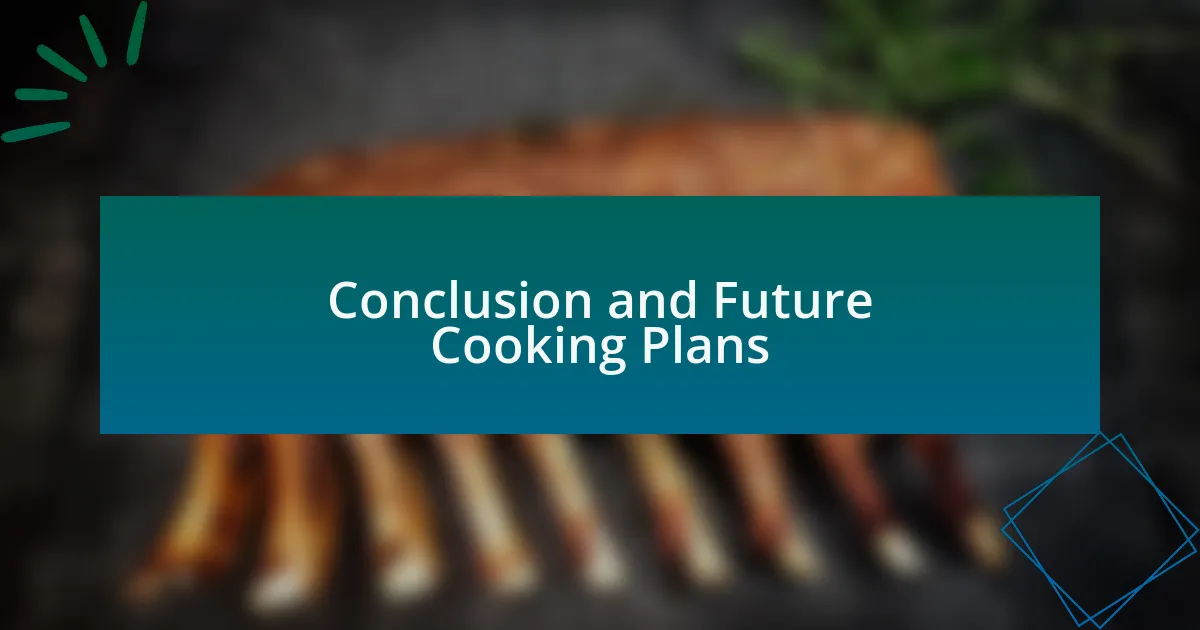
Mistakes in the kitchen have become stepping stones for my culinary journey. One time, I misread a recipe and added double the amount of a particular herb. Instead of discarding the dish, I adjusted the other ingredients and ended up with a vibrant and aromatic creation that has since become a seasonal staple. How exciting is it to think that one small oversight can lead to something utterly delicious?
Moving forward, I plan to continue embracing these culinary surprises. Whether it’s experimenting with new ingredient pairings or reimagining classic dishes, every kitchen mishap holds a lesson waiting to be explored. Isn’t it fascinating to think about the potential that lies within each mistake, just waiting to be uncovered?
I’ve recently started a personal challenge: to cook with one “mistake” ingredient each week. This approach motivates me to think outside the box and confront the fear of failure. By sharing these experiences with fellow food enthusiasts, I hope to inspire others to take their own culinary risks and celebrate the joys of unpredictability in cooking. What creative solutions have you discovered through your own kitchen errors?
